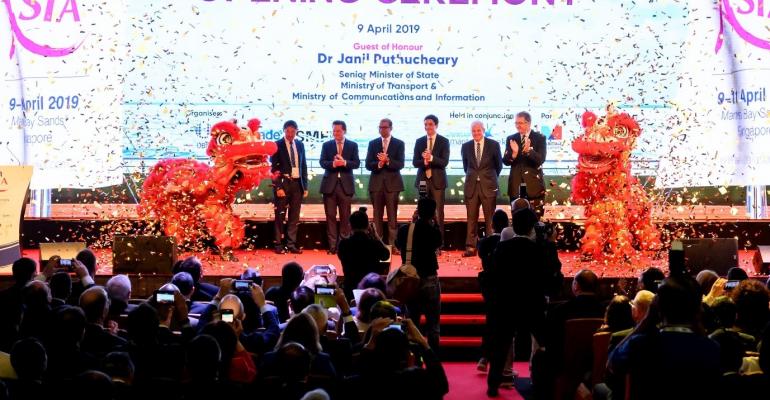In his speech to the opening ceremony Minister Puthucheary noted that despite the current turmoil the maritime sector remained more relevant than ever before with 90% of global trade carried by sea and demand continuing to grow each year, with Asia one of the strongest growing regions for the next few years. Asean too was a key driver with a population of 650m and projected to become the world’s fourth largest economy by 2030.
However, many challenges also lie ahead with disruption and digitalisation, tighter environmental regulations and the manpower crunch. “But it is not going to be business-as-usual for the maritime sector, it can’t be business as usual,” the Minister stated.
Puthucheary noted the challenges faced by shipping from non-traditional players such as Alibaba and Amazon, and new business models that could disrupt players with traditional business models.
He spoke of the opportunities presented by digital connectivity, and also noted the hype cycle around some of the technology, but that these technologies would bring change.
For Singapore this means harnessing the power of digital technologies to remain competitive and one such example was Singapore’s shipping community and government agencies coming together to develop an electronic Bill of Lading (eBL) under Singapore’s TradeTrust Framework.
Seatrade Maritime News is reporting Live from Sea Asia 2019
On the challenge of cleaner shipping the Minister said that Singapore was prepared for the introduction of the IMO 2020 0.5% sulphur cap for marine fuels with minimum disruption to the industry. He noted Shell and BP had selected Singapore as key location where low sulphur fuel would be available and there was a list of 49 licensed bunker suppliers of low-sulphur fuels in the port.in
On the competition for talent Singapore continued to invest in people to ensure a continuous pipeline of maritime manpower. Included in this investment is the Maritime Cluster Fund Manpower Development Programme, administered by Maritime & Port Authority of Singapore, which co-funds training for more than 5,000 individuals a year.
Chris Hayman, chairman of Seatrade, Informa Markets, also spoke of the opportunity Sea Asia presents industry players to collaborate and address the challenges posed by digitisation, the global economic outlook and the sulphur cap.
Singapore Maritime Foundation chairman, Andreas Sohmen-Pao, commented on the challenges faced by the industry and the need for events such as Sea Asia to gather together to share ideas and find solutions to the numerous challenges ahead.
“Singapore has an important role to play in this, as a leading maritime centre, and as a wonderful gathering place for talent and ideas. You all know what a responsive government we have here, channeling efforts to support business success,” Sohmen-Pao said.
“Those of you from overseas might be amazed to see how much innovation is happening here. This year we have the Innovation Arena at Sea Asia, which will showcase eight start-ups. As some jurisdictions around the world become less friendly to business, you may wish to consider beefing up your presence here.”
Copyright © 2024. All rights reserved. Seatrade, a trading name of Informa Markets (UK) Limited. Add Seatrade Maritime News to your Google News feed.



